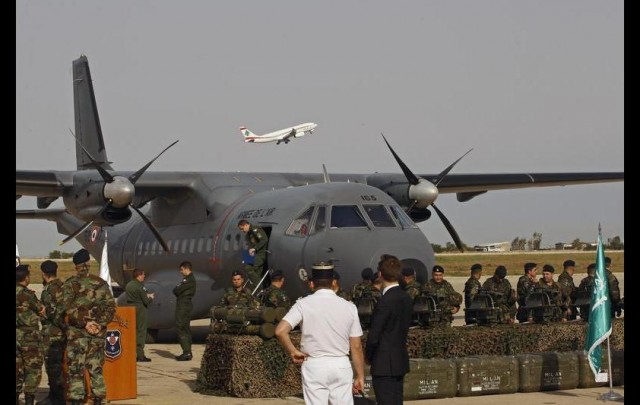
Russia has offered Lebanon a $1 billion line of credit to purchase armament for the Lebanese Army with favourable repayment terms in what many in Lebanon are interpreting as a push by Moscow to expand its influence from neighbouring Syria into Lebanon at the expense of the United States.
The Russian offer comes as Moscow reportedly seeks a military cooperation deal with Beirut that would allow Russian naval vessels and aircraft access to Lebanese seaports and airports.
The $1 billion deal has triggered alarms in Washington and London. The United States and the United Kingdom have signalled to Lebanese Prime Minister Saad Hariri that, if the Russian arms deal is accepted, it could jeopardise existing military assistance programmes provided by both countries to the Lebanese military, diplomatic and political sources in Lebanon said.
“If Lebanon accepts or even insinuates an intent to accept a Russian credit line for the purchase of Russian defence articles, it will have significant — and potentially irreversible — geopolitical consequences on Lebanon’s existing bilateral and multilateral commitments and partnerships, especially ties to the United States,” said Aram Nerguizian, CEO of the Mortons Group, a strategy consultancy in Washington.
Lebanese government sources denied that any warnings had been received regarding the Russian offer, adding that the line of credit existed since the signing of a memorandum of understanding with Moscow in 2010. The sources said the Lebanese government in such cases asks the Lebanese Army to assess if the supplier’s offer is compatible with the military’s needs.
“This has not been answered yet. In all cases, the government or Lebanese Army will not endanger existing strategic relationships. They are both adults and don’t need warnings,” the source said on condition of anonymity.
The offer, which has yet to be formally announced, was not raised in Rome where 41 countries assembled for a conference to support the Lebanese Army and police. On the sidelines of the conference, Hariri met with Mikhail Bogdanov, deputy Russian foreign minister with responsibilities for the Middle East.
“We have a fruitful cooperation with Lebanon since a long time in various fields, including enhancing the combat capabilities of the army so that it can fight against [the Islamic State] and [Jabhat al-Nusra],” Bogdanov said after the meeting.
The United States has delivered more than $1.6 billion in weapons, training and equipment since 2005. Although the Lebanese Army does have some Soviet-era equipment, most of its modern weaponry is American and compatible with NATO. The United Kingdom has a training programme for the Lebanese Army and has helped establish four land border regiments guarding Lebanon’s porous border with Syria.
The Russian $1 billion credit line allows for a 15-year repayment term at 0% interest, Lebanese politicians and diplomats familiar with the deal said. Hariri visited Moscow last September to enhance Lebanon’s economic and military ties to Russia. Following talks with Russian President Vladimir Putin in Sochi, Hariri said the two leaders had discussed “Russia’s military assistance to Lebanon and ways to develop this relationship and facilitate the purchase of Russian equipment through a credit line.”
Since intervening militarily in Syria in 2015 to assist the regime of Syrian President Bashar Assad, Russia has become a key player in the conflict, to an extent supplanting the United States, which has seen its influence diminish as the Syrian regime gains ground against rebel forces.
Moscow may view Lebanon as relatively easy pickings, given the apparent willingness of the Lebanese government to foster greater commercial and military ties with Russia.
US influence in Lebanon has declined since October 2016 when a decade-long political confrontation between rival Western-backed and Iran-supported parliamentary blocs ended with the latter victorious, leaving Hezbollah as the undisputed domestic power.
However, it is unclear whether the Lebanese government will accept the Russian offer, given the potential ramifications.
“If we go with the Russians, the United States and the United Kingdom will walk away from Lebanon and that will leave us with few friends in the West and open to punitive sanctions,” said a Lebanese parliamentarian on condition of anonymity. “Why should we pay for Russian equipment when we have been receiving American weaponry for free for more than 10 years?”
The line of credit offer is not the only indication of growing Russian interest in Lebanon. Russian companies are bidding for rights to explore for gas and oil off the Lebanese coast. Lebanon and Russia have strengthened educational and cultural contacts. Hariri has called on Russian companies to invest in Lebanese infrastructure projects.
Russian Prime Minister Dmitry Medvedev recently instructed the Russian Defence Ministry to negotiate with its Lebanese counterpart to forge a military cooperation agreement, Russian news reports stated. Other than rights to use Lebanese sea and airports, the agreement would allow Russian soldiers to train the Lebanese Army, to have joint military exercises and to cooperate in anti-terrorism measures.
If Lebanon accepts the $1 billion deal, the perception internationally will be that Beirut is choosing to align with Russia and its regional partners Damascus and Tehran at the expense of Europe, the United States and Lebanon’s regional allies in the Gulf, said Nerguizian.
“All of this undermines international goodwill towards Lebanon and undermines mitigating forces that could come to Lebanon’s aid in the event of a future conflict with Israel,” he said.

Leave a Reply
You must be logged in to post a comment.